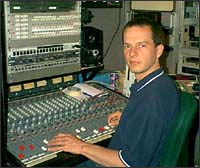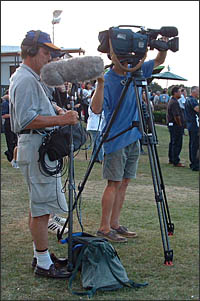The Television Sound Operator
The position of television sound engineer or sound operator can cover a number of different specific roles, including:
- Operating a mixing console (desk) in a studio or outside broadcast control room.
- Performing sound-related duties in a studio such as microphone placement, etc.
- Operating a portable sound mixer and/or recorder on location.
Whatever the position, the operator is expected to at least a fundamental understanding of basic audio theory. Certain positions may require more advanced skills.

Console (Mixing Desk) Operators
In this position the operator controls multiple sources of audio via a mixing desk. Audio sources can include:
- Vocal microphones for presenters and other talent
- Effects mics (crowd, etc)
- Pre-recorded audio clips
- Audio from video tape/disk machines
- Music
- Ambient audio track
The sources are each assigned a channel on the desk and mixed into a main program feed to go with the vision. Additional mixes may also be provided for separate recordings, communication channels, etc.

Field Operators
Field sound operators accompany the camera operator on location. The sound operator captures and records audio using external mics, mixer and recorder, or the camera mic and recorder, or a combination of both.
A typical audio field kit might include a small portable mixer, headphones, recorder, shotgun mic, hand-held vocal mics and lapel mics.
The sound operator's responsibilities can include:
- Placing mics on talent and ensuring they are correctly used
- Positioning effects mics
- Holding a boom mic
- Monitoring audio levels and quality
- Ensuring the audio is being correctly recorded